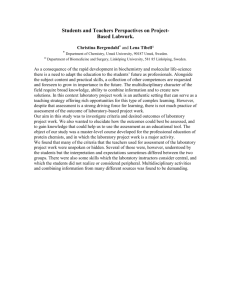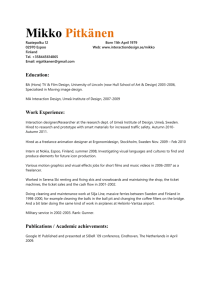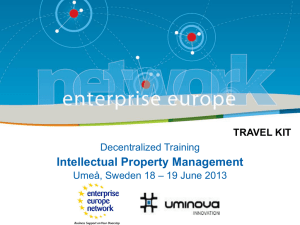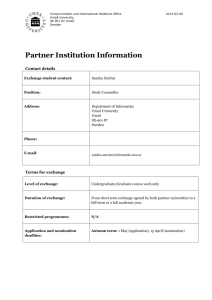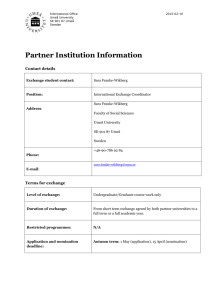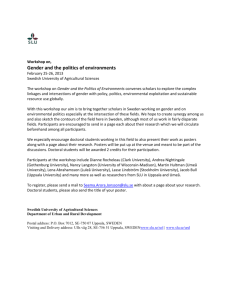Preparatory Report - Diversity in the city: urban policies of inclusion
advertisement
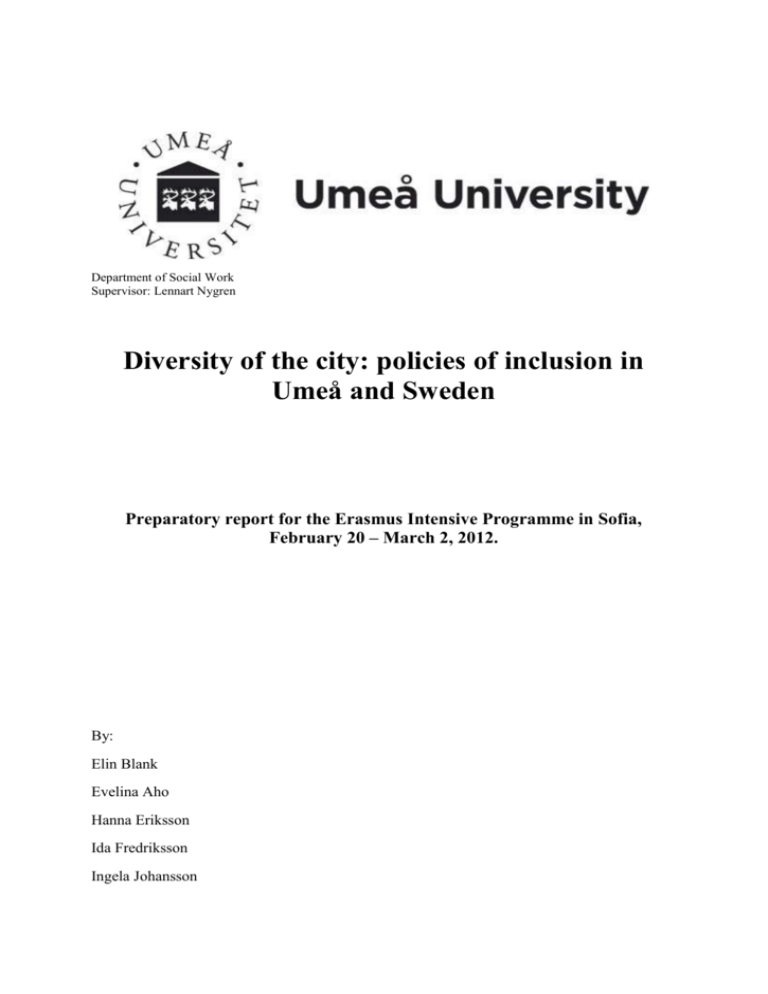
Department of Social Work
Supervisor: Lennart Nygren
Diversity of the city: policies of inclusion in
Umeå and Sweden
Preparatory report for the Erasmus Intensive Programme in Sofia,
February 20 – March 2, 2012.
By:
Elin Blank
Evelina Aho
Hanna Eriksson
Ida Fredriksson
Ingela Johansson
1
Table of contents
Introduction............................................................................................................................................. 4
1. Inclusion policies of the City of Umeå ................................................................................................. 4
1A. General local inclusion policies ..................................................................................................... 4
1B. Programmes for vulnerable groups .............................................................................................. 4
Disability and impairment ............................................................................................................... 4
Elderly .............................................................................................................................................. 4
Reception of refugees ..................................................................................................................... 4
PREI .................................................................................................................................................. 5
Unaccompanied children................................................................................................................. 5
In i Umeå ......................................................................................................................................... 5
Viva kompetenscentrum ................................................................................................................. 5
Öppen Gemenskap .......................................................................................................................... 5
Nattvandrarna and other voluntary organisations ......................................................................... 6
Women’s Aid. .................................................................................................................................. 6
Men’s Aid......................................................................................................................................... 6
2. National inclusion policies of Sweden ................................................................................................. 6
2A. If there is a special program, what major activities are parts of it? ............................................. 6
Family .............................................................................................................................................. 7
Immigration ..................................................................................................................................... 7
School .............................................................................................................................................. 7
Elderly .............................................................................................................................................. 7
Disability/Impairment. .................................................................................................................... 8
Health Care ...................................................................................................................................... 8
2B. If there is not a special program, provide analysis why? .............................................................. 8
2C. How is the civil society included in the decision making process? ............................................... 8
3. Important programs in recent national social inclusion strategies and action plans ....................... 10
2
Equitable refugee policy ................................................................................................................ 10
Care for people with alcohol and/or drug abuse .......................................................................... 10
LGBT (Lesbian, Gay, Bisexual and Transgender)............................................................................ 11
References: ............................................................................................................................................ 12
3
Introduction
Sweden has approximately 9.5 million inhabitants. The Government has the overall
responsibility for the social policies and some of them, like the pension scheme and health
insurance are managed by Government authority. The country is divided in 21 counties,
where the political congregation is responsible for the majority of the health care.
Furthermore, the political management of the 290 municipalities have the power to work out
the frames for a number of social services such as: child welfare, the care of elderly and
disabled and different family-based services.
1. Inclusion policies of the City of Umeå
1A. General local inclusion policies
There is no specific programme for social inclusion in Umeå. However, the local goals and
visions of the Social Services give a clear image of the kind of society that the municipality
wants to create. One of the most important goals of the Social Service is the following:
“Everyone should have the same rights, opportunities and obligations no matter their
ethnicity, religion, disability, sexuality, or social background” (Social Services, 2011). This
core value is reflected in the goals of the different kinds of operations that the Social Service
manages. Below are some examples of the different areas that are run by the Social Service or
the municipality.
1B. Programmes for vulnerable groups
Disability and impairment
To improve the life of the disabled in the society, the Social Services in the City of Umeå has
taken measurements to make sure that the person in need of assistance, is incorporated in the
decision making progress when choosing treatment plans and rehabilitation programs. One of
the objectives of the Social Service is to empower the disabled/impaired to a more
independent living in their everyday life. Other objectives are to create possibilities for the
individual to get employment or to participate in other daily activities.
Elderly
The general goals of the municipality, concerning the elderly, is to make them feel safe while
aging, create possibilities for them to live an active life, give them the power influence their
everyday life as well as the society, make sure that they have access to good healthcare and
are treated with respect. The vision of the municipality for the elderly is to be able to stay at
home for as long as they chose. If the person in question chooses to stay at home (instead of
moving to a retirement home), the municipality is obliged to provide assistance in their home
if needed.
Reception of refugees
The premises of employment are a factor in society that affects the refugees’ chances of being
economically independent. The vision is to in the long run become the best in refugee
reception in Europe. The municipality’s strategies to carry out this goal are, among others:
influencing attitudes among the employers, making Swedish language more efficient,
informing about startups entrepreneurship, cooperating with the civil society for increasing
relationships between Swedes and new arrivals, working for a fast family reunion and
4
building consciousness about the new country’s diversities and the individual’s own role and
responsibilities.
The city itself does not have a special programme for migrants and other vulnerable groups
(apart from the national programmes for newly arrived refugees, for example SFI - Swedish
For Immigrants). There are, however, various help organisations who do different kinds of
social work.
PREI
PREI (Prepared Integration) is a Non-Governmental Organisation that focuses on integration
and solidarity for people of different nationalities in Umeå. The organization was founded by
six women who wanted to create an organization in which people of different nationalities
could meet, exchange experiences and help each other to adapt to their new realities in
Sweden. Originally the organisation centred on the situation of newly arrived women, but
today it includes both women and men of all ages and of all different nationalities (including
Swedes). Their main objectives are to help people integrate into the Swedish society, fight
against isolation among newly arrived immigrants and to work against culture clashes. To
reach out to their target groups they apply a “Knock on the Door” policy and Swedes and
immigrants work side by side to accomplish the objectives of the organisation.
Unaccompanied children
In 2007, Umeå started to receive unaccompanied refugee children, on behalf of the Migration
Board. This means that the children, immediately after their arrival to Sweden, are transported
to Umeå where the municipality provides a safe environment during the first time in the new
country. While waiting for the Migration Board to decide whether a residence permit is
granted or not, the municipality is responsible for the children.
In i Umeå
In i Umeå (Into Umeå) is a local and unique project pursued by the municipality of Umeå,
department of leisure. The project is cooperating with both Viva Introduction and
Integrationsnätverket (A nonreligious, politically independent and non-profit association
working for the rights of asylum seekers). The aim of the project is to make the NOG’s and
different associations in Umeå more open and accessible for newly arrived immigrants. By
creating meeting places through citizens associations Umeå wants to offer a platform for
integration on equal terms for everyone. The project provides a variation of activities like
sports and outdoor activities.
Viva kompetenscentrum
Viva is a competence center responsible for issues related to guidance and counseling,
introduction of the community for refugees, adult education and labor market in Umeå. The
center provides support to make changes in people’s lives, creates possibilities and integrates
people in the society. Viva cooperates, among others, with Arbetsförmedlingen (the
employment service), pre-school and comprehensive school, Försäkringskassan (The Swedish
Social Insurance Agency) and the municipal social services.
Öppen Gemenskap
Öppen Gemenskap (Open Solidarity) is a non-profit organisation who works for vulnerable
groups (such as people addicted to alcohol and/or drugs, homeless people and people with
mental illnesses) in Umeå. Since the organization is based on Christian values it receives
financial support from different congregations in the region. It also receives financial
contributions from the municipality. The aims of the organisation are to provide help and
5
support for vulnerable groups by offering a wide range of help-programmes and treatments.
To find people in need of help they patrol the streets to make sure that no one is left behind.
They also manage a store and a small restaurant where they offer work to people who have
been outside the system and have difficulties finding a job. Apart from that they also help
people finding temporary homes, who because of their past, might have difficulties finding a
place to live. Finally, they also run a women’s refuge and arrange activities for the relatives of
the people they help.
Nattvandrarna and other voluntary organisations
Nattvandrarna (Night wanderers) is a voluntary organisation created by UmeBRÅ (a crime
fighting organisation) and Umeå C (an organisation that develops the city centre), who’s task
is to patrol the streets of the city during the weekends, to make sure that the city centre is safe.
Local sports- and other organisations volunteer to patrol the streets wearing yellow jackets,
making it easier for people to recognize them. Other voluntary organisations in Umeå are
Frivilligcentralen (Voluntary central) and Umeå Volontärcenter (The centre of Volunteers in
Umeå). The objectives of these organisations are to fight loneliness and alienation in the
society. The municipality also arranges opportunities to volunteer at retirement homes to
accompany the elderly during their day at the home.
Women’s aid
In Umeå municipality there are a women’s aid providing support to girls and women who’s
been threatened or exposed to violence and abuse. It is a voluntary, feministic, non-political
and non-religious organization. The women’s aid provides support, council, emergency
shelter and protection for women, children and transsexual. The organization works
confidentially and the people contacting them have the right to stay anonymous.
Men’s aid
In Umeå there is also men’s aid. Through phone calls, individual dialogues and dialogues in
groups they offer men support by listening, providing emotional support, helping them
finding choices of paths in life and working for children’s right to their both parents. The
people working at the men’s aid are volunteering men with life experience that want to make
an effort for fellow humans.
2. National inclusion policies of Sweden
2A. If there is a special program, what major activities are parts of it?
Sweden is known for the universal welfare/ social democracy model (Meeuwisse A, 2006).
We rely on the state as an instrument to guide the policies regarding the social welfare. The
model is distinguished by a small private sector, big governmental systems, high taxes to
include a wide range of individuals. The system goals are to redistribute resources between
the rich and the poor, and between the working individuals and those not working, i.e.
pensioners, long-term sick etc. Sweden has high taxes and some of them are income tax
approximately 30-50 percent, value-added tax (VAT) approximately 6-25 percent,
employment (payroll) tax approximately 32 percent.
Sweden has many social inclusion programs that try to include all citizens who live or works
in Sweden. A big part of the social insurance is based on high taxes which finance the states
social programs. Non-governmental non-profit organizations exist and their role has
increased, as has the role of for-profit private organizations. Sweden has social insurance
6
agencies and their role is to administer social insurance and ensure you get the benefits and
allowances the citizens are entitled to. Groups that are included in different policies are for
example people with disabilities, impairments, the elderly, children, parents, youth,
immigrants, unemployment etc.
The welfare policy’s aim is to create equal terms for the whole population. “A welfare policy
that covers everyone is most likely, in the long term, to create adequate, accessible and
financially sustainable security systems” ( Sweden’s strategy report for social protection and
social inclusion 2008–2010, p 11). The policy works as people who contributes also receives
benefits from it through life, like health care, long-term care and general pension systems. The
aim is to prevent poverty, reduce gaps between groups and social exclusion in society. The
conditions for this model to work are that we have high employment levels to make it
financially sustainable. People’s personal and social developments through work or studies
are important factors for participation in society.
Family
One parent has the right to be home and take care of their infant for 18 months, with 77,6
percent of their previous income. If men use the same amount of leave of absence as women
they receive a bonus at the highest amount of 13 500 kronor (1500 euro). To encourage both
men and women to work, Sweden has established day care centers for their children from the
child’s age of one year. Parents to young children also have the right to work only 75 percent.
Parents (or another adult) have the right to care for their child if they are sick and they get 80
percent of their salary from the social insurance system.
Immigration
Sweden has different programs to include immigrants. The states’ long term goal is mutual
respect for differences and society's fundamental democratic values. Regardless of
background or ancestry should all citizens be involved in and responsible for society, and
shall be free from discrimination.When you apply to get a residence permit in Sweden, it
offers one apartment that can be anywhere. To survive the immigrants get a daily allowance
until they get a residence permit. Immigrants have the right to Swedish for beginners (SFI) to
get integrated in society. Children who come to Sweden have the right to education despite if
they are paperless (but the families are often scared of getting detected, so child is held at
home). All immigrants have the right to health care, but the risk among paperless make them
only go in dire emergency.
School
School attendance is compulsory from the age of 7 years old (from 6 years old they can
choose to be in school) until they leave elementary school (age 16). If a child doesn’t show up
for school the police can pick the child up and drive the child to school, (but this is only used
as the last measure.) It doesn’t cost anything because the goal is to include everyone (but
private schools exists with fees) and the schools must also offer lunch for free to all the
children. The municipality is obligated to offer children between 6-12 years old (or spring
semester when they turn 13) activities after school hours, to make it possible for both parents
to combine work with having a child.
Elderly
At the age of 65 a person is entitled to retire, but one doesn’t have to, until the age of 67.
Instead of receiving salary, pension is sent out monthly, based on how much they have earned
through life, although there is a minimum pension for those with little or non-working years.
If an elderly person need help with their daily life (dishes, dressing, daily intake of medication
7
etc.) the local authorities, t.e. the municipalities, offers home-help services. The law of social
services (Socialtjänstlagen, SOL) decides what service they have the right to get. If they can’t
live at home, they can move in to an apartment complex with a restaurant, daily activities,
common room to counteract social exclusion. The official policy says that the life of the
elderlies shall be defined by dignity and good social welfare. It also states that the elderly
shall be more included in the decision-making regarding their own situation. Then it’s up to
the municipalities to organize and develop the local elderly care.
Disability/Impairment
Sweden has a law of support and service (Lagen om Stöd och Service, LSS) that regulates
what people with disabilities or impairments are entitled to get. The main goal is that a person
with physical or mental disabilities shall have the same possibilities and terms as others to
achieve full participation in society. They can for example get special commendation/living,
daily activity, home-help service, food distribution, aiding instruments, housing adjustment
grant, disability allowance. According to the state the goal is that the disability perspective
should permeate all levels of society, to create an accessible society and to improve the
encounter with the society.
Health Care
The care givers are obligated to give all citizens access to continues contact with a doctor. A
doctor’s appointment is heavily subsidized and costs about 150-300 SEK (15-30 €). In
Sweden the health care are obligated to give specified information to the patient. The patients
have influence over choice of treatment in equivalent alternatives. The patient always has the
right to a second opinion in difficult medical standpoints. The state guarantees a limited
waiting period to people seeking care, which is 3 months, for specialized and already planned
care. A patient always has the right to refuse care. The state has an organization for children’s
and youth’s psychiatric health (BUP). For example suicide tendencies, depression, ADHD,
relation problems in the family/with friends, anorexia. In order for young people to get
information/treatment/help Sweden has youth clinics (for 13-23 years old) and it doesn’t cost
anything for them to visit a doctor. Birth control pills are almost free (2 euro /6 months) for
girls from 13 to 23 (depends on the county you live in) years old, to prevent young people to
have unwanted children. To help people with alcohol and/or drug abuse Sweden has the law
of care concerning people with alcohol and/or drug abuse (lagen om vård av missbrukare,
LVM).
2B. If there is not a special program, provide analysis why?
Sweden has in recent years (due to the economic crises, change in political leadership and
politics) been obligated to change. More private welfare organizations have been included in
the welfare politic than before. Private organizations are given more power to change the
welfare system under the promise of high efficiency level and freedom of choice for the
patients. Some areas receive less state financial support than others. One example is the social
work for the homeless. In this area the non-governmental organizations often have more
responsibility. Sweden has policies for social inclusion on a governmental level. These
policies are then implemented on a regional and local level. This means there can be
differences between one county council and municipality with others.
2C. How is the civil society included in the decision making process?
Every state/county in Sweden has a regional authority - the county board. Candidates are
elected for the county council (and they decide the board). The citizens of Sweden can
8
influence by giving citizens’ initiative suggestions, to vote in elections or by appeal against a
decision. The parliament and government are represented in the regional level. Citizens can
influence by their voting for the parliament, by raising awareness for specific questions in
media - as regulated in the constitution - by organizing meetings for lobbying,
demonstrations, contacting the parliamentarians, attending meetings etc.
The non-governmental actors and organizations has become increasingly powerful in the
decision making process. The numbers of non-state actors on local, regional and international
level has grown rapidly in recent years.
The growth of NGO’s could indicate larger citizen participation, as well as the fact that
NGO’s and social movements are becoming more visible in Sweden than ever before. In the
networks of social relations the NGO’s create knowledge, ideas and practices can be shared.
The act of NGO’s as speakers of the civil society are consisted by forms of communication
and information-sharing, discussion and debates, where these networks put issues on the
political agenda. The NGO’s can put pressure on the politicians or the parties to vote for law
regulations or legislative changes.
It is for instance the government and parliamentarians which can give proposals to the
Parliament. Both individuals and organizations are able to influence the MPs by contacting a
parliamentary party or MP to discuss various issues. Organizations can also be called
lobbyists, which try to influence the policy through direct contacts with politicians,
government officials and other decision makers.
To observe different interest issues are not the only strategy a lobbyist use. A common
method to bring proposals to agenda (proposals they think the state is not taken seriously) the
lobbyist himself can make an investigation in the subject, like the one State would have done.
Another way to influence is to get the press and the media to address various topics. Lobbyists
can write articles to get published in the newspaper. This way of lobbying can be used both
when you want to bring forward proposals and when you want to stop the current proposals.
From a democratic point of view this has both positive and negative effects. Those
organizations and NGOs that have greater financial resources have an advantage in this way
of influence the politics (eg. Pay for advertising costs), but at the same time lobbying is open
for everyone to join, even if they are not involved in a particular party.
NGOs opinions about problems in society contribute to better decision-making among the
politicians.
One example of NGO which is very active in lobbying is BRIS – the children’s rights in
society (Barnens rätt i samhället). BRIS is a nonprofit Swedish organization that works with
children's issues. In Sweden, only people over 18 have the right to vote. BRIS has noticed the
need to help and support the children and their rights. In Sweden it is illegal to discriminate
children, spanking children and all forms of child abuse both physical and psychological. It is
strictly forbidden to punish children in all physical forms since 1979. Yet it is not all children
that are treated well. Therefore, BRIS has started a hotline that is free and completely
anonymous helpline for children to talk to an adult about their problems. BRIS also have a
chat and e-mail forum where children can contact if they want to talk and get support. BRIS
receives over 10 000 calls per year, and nearly as many mails. BRIS also receives calls from
adults who need someone to talk to about their own or other children.
BRIS work as a lobbyist and referral organization to increase adults' respect for children as
individuals and to make them follow the Convention on the Rights of the child by the UN.
9
The uniqueness of BRIS documentation of contacts with children is that the children talk
about their lives based on their own needs and their opinions are based on their own
perspective in life. BRIS use their collective knowledge of children and youth to inform,
influence and create public opinion in child law matters.
The Red Cross is another NGO that has a great importance in Sweden. The Red Cross works
internationally and nationally, the needs are clearly different in the world, but the Red Cross
mission is the same worldwide. Their job is to prevent and alleviate human suffering. Swedish
Red Cross was founded in 1865 and is today Sweden's largest humanitarian NGO. The Red
Cross in Sweden has almost 30 000 volunteers. When there has been a need in the community
which not have been fulfilled by the state, Red Cross have been a powerful factor of funding
different welfare issues which later has been taken over by the public welfare system and
state. The Red Cross has been an important part of pushing for health and social community
issues. Examples of this are public dental care and home-help for elderly. Today Red Cross
support paperless refugees health care and have a treatment center for torture and warwounded refugees.
In conclusion the non-governmental organizations have become increasingly important and
powerful actors in the society in Sweden.
3. Important programs in recent national social inclusion strategies
and action plans
Equitable refugee policy
In the mid 90ies Sweden introduced the opportunity for refugees to live outside the temporary
refugee centers. This means the immigrants have the right to chose where they want to live
(EBO). Since then many municipalities have been dissatisfied and pointed out difficulties for
both the refugees and the undertaking municipalities. A (government) bill has recently been
initiated by the government concerning an equitable refugee policy. The bill describes how a
few cities in Sweden carry the main responsibility of receiving refugees. The result of this is a
lack of living space and other problems in their daily life. The bill says all municipalities must
have a joint responsibility for the receiving of immigrants. Therefore the government means
the rules of EBO need to change.
We must learn to take advantage of the knowledge and competence of the people coming to
Sweden. It is important to provide information about employment, startups entrepreneurship
and employers’ rights. A special responsibility should be given to the universities to provide
the refugees with an academic background an opportunity to supplement their education
Care for people with alcohol and/or drug abuse
The municipality is in charge of some problems the individual has, and the county council on
others. This is problematic for the individual that is affected when no one claims they are
responsible for him/her, because he/she doesn’t get the care he/she has the right to. For this to
change is the aim in the proposal.
The report that has been issued from the government considers changes in the responsibility
between the municipally and county council. It’s important to make it more clear who has the
main the responsibility for different target groups, for example people with an unsafe
consumption. The responsibility for the central part of care and support, for example the
sobriety activities, abstinence care, treatment and support between the municipality and
10
county council is important to be clearer than it is today. The proposal from the government
should give the individuals it concerns better help with an addiction or misuse. The goal is to
improve the help available at the right time, create -a more knowledge based care that is
individually based An important part is to develop a working care with or without consent in a
joined care- and support process, a care that contains to analyze the responsibility, to plan a
cohesive care, and to follow up the effects and efficiency is imperative.
In conclusion this would mean a vulnerable group will have a better chance to be in included
in the care system.
LGBT (Lesbian, Gay, Bisexual and Transgender)
The most actual discussion in LGBT-society is the fact that you are obliged by law to get
sterilized, not have a registered partnership and not to have any frozen semen or eggs (for
future insemination), if you are transgender and want to switch gender. The Swedish law that
regulates this (Law 1972:119) was approved in 1972 and has since then only had small
changes. The Swedish Government was supposed to change the law and withdraw the
demand on sterilization on the 12th of January this year. However, one of the parties was still
against the changing of the law and because of that, the Government decided to uphold the
discussion and examine the matter further. This was heavily criticized due to the fact that
Socialstyrelsen (Swedish National Board of Health and Welfare) investigated the matter
thoroughly in 2010, which resulted in a extensive report, meaning that the Government
already has plenty of material to work with. The decision to prolong the investigation resulted
immediately in various protest actions throughout the country and also became a heavily
discussed topic in media.
Since there has been no other recent discussion concerning the LGBT-society on
Governmental level, we have chosen to present some of the biggest changes in laws
considering this group during the 21st century. In 2003, a law concerning adoption for
homosexual couples was approved by the Swedish Government. This meant that homosexual
couples were able to apply for an adoption and also to adopt each other’s children. Although
the law was approved as early as 2003, the adoption agencies in Sweden don’t have any
agreements, concerning homosexual couples, with the countries that are normally used to
procure an adoption. This means that there still are very few possibilities for homosexual
couples to be able to adopt a child.
When the above mentioned law was discussed by Swedish Government, they decided that
they were not ready to decide upon IVF-treatments for lesbian couples. However, the decision
to let lesbian couples use IVF-treatment to get pregnant was made in 2005. In 2006, the
County Council of Västerbotten (the county in which Umeå is situated) worked out the frames
for lesbian IVF-treatment, and the decisions made by the Council was all but pleasing for the
gay community. Umeå is said to be the most LGBT-friendly city in Sweden. However, IVFtreatments for lesbian couples in the region are very expensive (1200 euro/treatment, while
the fee for heterosexual couples is heavily subsidized). The decision to not subsidize IVFtreatment is based on the fact that “the incapability of pregnancy is due to other factors than
illness” (County Council of Västerbotten). This has been heavily discussed in media since
most other County Councils in Sweden has chosen to subsidize the treatment or to offer the
treatment for the same price as for heterosexual couples.
11
References:
Meeuwisse Anna, Sunesson Sunne, Swärd Hans (2006) SOCIALT ARBETE. EN
GRUNDBOK. Bokförlaget natur och kultur: Stockholm
International Civil Society - Exploring Political and Cultural Context. Marlies Glasius, David
Lewis, Hakan Seckinelgin, 2004. Förlag: Routledge
Barn- Och Ungdomspsykiatri Stockholms Läns Landsting (Child and Youth Psychiatry
Stockholm County Council )
http://bup.se/sv/Fakta-om-BUP/BUP-i-siffror/
Boverket (National Board of Housing, Building and Planning)
http://www.boverket.se/Global/Webbokhandel/Dokument/2008/Asylsokandes_eget_boende_EBO_3.pdf
BRIS – Barnens Rätt I Samhället (Children’s Right In Society)
http:// www.bris.se/upload/Material/OmBRIS_150x120.pdf
Förbundet Sveriges Arbetsterapeuter (the Union Sweden’s Occupational Therapists)
http://www.fsa.akademikerhuset.se/Tidskriften/2011---nummer/TA-nr-4/TA--Stora-forandringar-inommissbruksvarden-foreslas/
Försäkringskassan (Swedish Social Insurance Administration)
http://www.forsakringskassan.se/privatpers/foralder/planera/jamstalldhetsbonus/
http://www.forsakringskassan.se/privatpers/funktionsnedsattning/handikappersattning/
Kvinnojouren i Umeå (Women’s Aid In Umeå)
http://www.kvinnojoureniumea.se/var-jour/
Mansjouren Västerbotten (Men’s Aid Västerbotten)
http://www.mansjouren.ac.se/info.html
The Municipality of Bjuv
http://www2.bjuv.se/upload/V%C3%A5rd%20&%20Omsorg/Broschyrer/Funktionshinder.pdf
The Municipality of Umeå
http://www.umea.se/
http://www.umea.se/umeakommun/omsorgochhjalp/familjbarnochungdom/stodtillbarnochunga/mottagandeaven
samkommandebarn.4.620856de12d4bd3b4618000234.html
http://www.umea.se/umeakommun/kulturochfritid/foreningar/iniumeaintegrationgenomforeningsliv.4.3dd89af31
269bbc7ed880009728.html
http://www.umea.se/viva
The National Encyclopedia
http://www.ne.se/lang/aga/109080
http://www.ne.se/lang/ngo
Sveriges Riksdag (Parliament of Sweden)
http://www.riksdagen.se/webbnav/index.aspx?nid=410&dok_id=GZ02Sf323
Regeringskansliet (Government Offices)
http://www.regeringen.se/content/1/c4/09/90/3f7d5266.pdf
http://www.regeringen.se/content/1/c6/11/12/80/dcbafb1f.pdf
12
Regeringskansliets Rättsdatabaser (Government Offices’ Law Database)
http://www.notisum.se/rnp/sls/lag/19930387.htm
Riksförbundet För Sexuellt Likaberättigande (National Association for the Rights of the Gay,
Queer and Transgender)
http://www.rfsl.se
Röda Korset (Red Cross)
http://www.redcross.se/om-oss/sa-har-arbetar-vi/
http://www.redcross.se/om-oss/sa-har-arbetar-vi/grundprinciper/
http://www.redcross.se/om-oss/sa-har-arbetar-vi/nationellt/
Skatteverket (The Swedish Tax Agency)
http://www.skatteverket.se/privat/skatter/arbeteinkomst/vadblirskatten/marginalskatt
http://www.skatteverket.se/foretagorganisationer/moms/vadarmoms/
Socialstyrelsen (The National Board of Health and Welfare)
http://www.socialstyrelsen.se/aldre/nationellvardegrund
http://www.socialstyrelsen.se/Lists/Artikelkatalog/Attachments/18222/2011-1-7.pdf
http://www.socialstyrelsen.se/hittarattmyndighet/dinarattigheterivardochomsorg
http://www.socialstyrelsen.se/sosfs/1997-6
Stockholms Stad (Stockholm’s City)
http://www.stockholm.se/ForskolaSkola/Forskoleklass/Fragor--svar-om-forskoleklass/
The Swedish Government
http://www.regeringen.se
http://www.regeringen.se/content/1/c6/16/71/05/4a710efb.pdf
http://www.regeringen.se/sb/d/108/a/1299
http://www.regeringen.se/sb/d/134/a/624.
Swedish Migration Board
http://www.migrationsverket.se/info/464.html
The Swedish Statue Book Law (1972:119)
http://62.95.69.15/cgibin/thw?%24{HTML}=sfst_lst&%24{OOHTML}=sfst_dok&%24{SNHTML}=sfst_err&%24{BASE}=SFST&
%24{TRIPSHOW}=format%3DTHW&BET=1972%3A119%24
Västerbottens Läns Landsting (County Council of Västerbotten)
http://www.vll.se
Umeåregionen (The Region of Umeå)
http://www.flyktingmottagningen.se/UserFiles/vivakompetenscentrum/Dokument/Verksamhetsplan%20URflykt.
pdf
13
